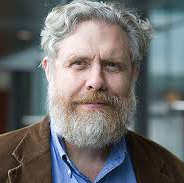George M. Church is the Robert Winthrop Professor of Genetics at Harvard Medical School, a Professor of Health Sciences and Technology at Harvard and the Massachusetts Institute of Technology (MIT), and a core faculty member of the Wyss Institute. He is the Principal Investigator of the Center for Genomically Engineered Organs (CGEO), and has led two prior Centers for Excellence in Genomic Science (CEGS): the Molecular and Genomics Imaging CEGS (MGIC, 2003-2008), and the Center for Causal Consequences of Variation (CCV, 2009-2015). In MGIC he developed next generation sequencing methods, versions of which are now widely used commercially by Illumina, Life Technology, and Complete Genomics, and conducted initial development of the Fluorescent In Situ Sequencing in situ sequencing (FISSEQ) method being employed and extended within CGEO. In the CCV, he developed numerous genome engineering tools, including pioneering work in the development of CRIPSR/Cas9 RNA-targeted genome engineering for human cells, new Cas9 functionality, and orthogonal Cas9s. The Church lab develops methods for efficiently engineering human induced Pluripotent Stem Cells (hiPSC), and for differentiating them into other cell types such as neurons. He has also developed methods for high-throughput DNA construct synthesis, as well as efficient methods for editing and recoding the genomes of microbial organisms through funding by the Department of Energy Genomic Science Program. Professor Church believes strongly in making innovations available to the research community through both Open Source and through relationships with companies. In 2005 he founded the Personal Genome Project (PGP), a framework for creating public and sharable biological samples and associated genome, health, and trait data obtained from volunteers interested in supporting open-ended scientific research. The informed consent procedures developed by the PGP have been used around the world and have been accepted by the NIH ENCODE project, which has analyzed PGP samples. Professor Church’s honors include election to the National Academies of Sciences (2011) and Engineering (2012), and the Franklin Institute’s Bower Award for Achievement in Science (2011).
